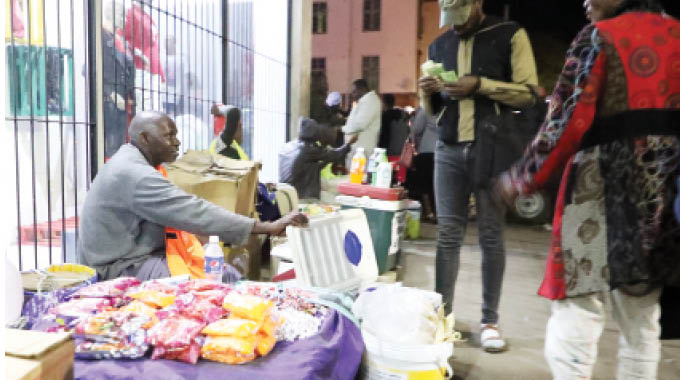Night vendors and the art of ‘spinning’ cash

Raymond Jaravaza, Chronicle Correspondent
FOR the middle-aged primary school teacher — with elementary knowledge of financial intricacies and business in general — it defies logic why a loaf of bread would cost more at an established bakery but sell for far less on the streets of Bulawayo yet the vendors selling the commodity still make a profit.
She has just bought a loaf of Bakers Inn bread at the corner of Sixth Avenue and Herbert Chitepo, a stone’s throw from a makeshift terminus where she will board a Zupco bus home to Cowdary Park, but Stella Nkomo cannot help but wonder how the vendor makes a profit.
The loaf of bread costs $18 and the vendors demand cash only.
Bakers Inn shops and the majority of established bakeries dotted around the city of Bulawayo sell a standard sliced loaf of bread for $20 and they accept all forms of payment ranging from cash, mobile payment services — such as Ecocash, and electronic transfers, otherwise known as plastic money.

The Saturday Leisure crew is on a quest to unravel one of the most baffling businesses scattered all over the street corners of the City of Kings conducted by the vendors at night and strikes up a conversation with Nkomo moments after she buys the loaf of bread.
“I still don’t understand how these people (vendors) make a profit selling bread at a lower price than in bakeries or supermarkets. This is a genuine load of Bakers Inn bread, it’s fresh and I buy bread almost every day from the same vendor and her price is always cheaper than in the Bakers Inn shops.
“Nothing seizes to amaze in this country. There is no way that any sane human being can sit on a street corner every night making a loss from selling the same commodity, day in day out,” laments Nkomo.
She is not alone when it comes to the intricacies of the vendors business model, which on the surface appears as if they are running a loss, selling bread at lower prices compared to bakeries and supermarkets.
To understand how it all works, the Saturday Leisure crew solicits a few interviews from vendors — all to no avail — until one male vendor lays conditions in order to speak out.
He demands that we buy two loaves of bread, strictly in cash, but take home a single loaf in exchange for the finer details of the night vendors’ business.
“It’s very simple my brother. I have connections at Bakers Inn who supply me with 100 loaves, at $20 each, everyday and I pay using swipe (electronic transfer) then I sell the bread here at night for $18, which by the way is a new price after recent increases.
“After selling all the bread, which I do almost every night, I take the $1 800 to a friend of mine who is a siphatheleni (illegal money changer) and he buys the cash for a 50 percent premium, which means he will transfer $2 700 into my back account. The following day I will buy another 100 loaves of bread from my connections and we split the profit.
“The only condition is that we don’t sell the bread near their shops because as you can see we even use their crates so it will raise suspicion how we are getting the bread,” narrated the vendor who jokingly says his name is Bra Joe.
Efforts to get a comment from Bakers Inn chief executive officer Ngoni Mazango were unsuccessful.
The bread vendors prefer selling the commodity at street corners after sunset, a time that is peak hour when commuters are rushing home after a long day at work.
Selling at night also means they are not bothered to be on the lookout for the prying eyes of Bulawayo City Council municipal officers who confiscate goods sold in undesignated areas.

Its win-win situation for the vendors, from evading arrest to making a quick buck selling bread that flies off their makeshift shelves in the streets like hot cakes.
The trade is, however, not limited to bread only.
Mealie meal is another commodity that is finding favour with night vendors. Mealie meal shortages that have hit the country in recent months are not helping the situation.
Unlike Bra Joe, who is well connected in the bread ‘industry’, a mother of twin teenage daughters, who wrote their ‘O’ Levels examinations last year, and only identified herself as Leticia, says scouring supermarkets in search of mealie meal is the order of the day.
She lives in Makokoba with her daughters and their day starts as early as 7am searching for supermarkets that have mealie meal on that particular.
The trick is to buy at least two 10 kilogramme bags of the staple food each every day using mobile transfer payments then sell the commodity on the streets when night falls.
“We target shops that do not force us to but other groceries in order to buy mealie meal and if they can allow us to buy two 10kgs each then we would have hit the jackpot. The shops employees must not know that we are a family otherwise they will refuse selling the mealie meal to all of us so we don’t join the queue at the same time.
“Each bag sells at $90 on the streets and we buy it for $70 using Ecocash. There are a lot of people who don’t have the time to spend in long queues and they happily buy from us at $90 per bag using cash only.
“I’m just trying to survive. There are no jobs out there and my daughters also help me buy the cheap mealie meal in supermarkets for resell in order for us to put food on the table,” says Leticia.
A quick survey on the streets of Bulawayo on Thursday night showed that street vendors that conduct their business at night sell wares ranging from cooking oil, body lotions, tooth pastes and even second hand clothes.
So cheeky are some of the vendors that they conduct their business right in front of the door steps of established supermarkets like OK Supermarket situated on King Lobengula street. — @RaymondJaravaza










Comments